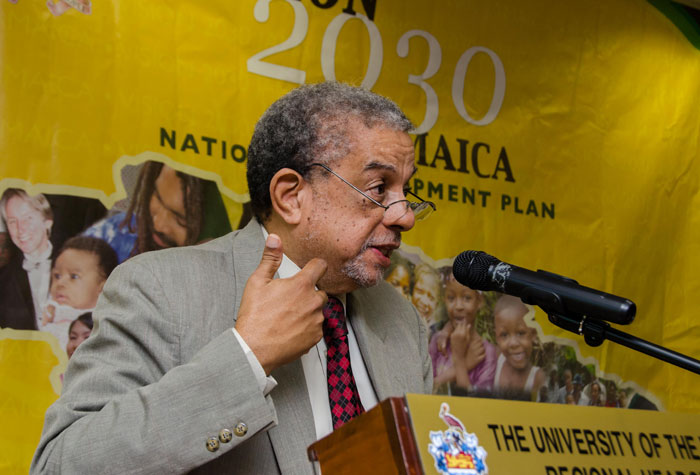Collaboration Key In Ensuring Continued Progress Under Vision 2030 – Bullock
By: , June 12, 2015The Key Point:
The Facts
- He said all interests, including private sector, civil society and international development partners, must continue to participate in the planning process, particularly in developing a consensus on the most important national issues facing the country in the short to medium terms.
- Mr. Bullock was speaking at a Vision 2030 country assessment and national prioritisation workshop at the University of the West Indies’ (UWI) Regional Headquarters in Mona on Thursday (June 11).
The Full Story
Director General of the Planning Institute of Jamaica (PIOJ), Colin Bullock, says greater collaboration among all stakeholders is crucial in ensuring that the country continues to make progress towards achieving key targets in areas of national development under Vision 2030 Jamaica.
He said all interests, including private sector, civil society and international development partners, must continue to participate in the planning process, particularly in developing a consensus on the most important national issues facing the country in the short to medium terms.
Mr. Bullock was speaking at a Vision 2030 country assessment and national prioritisation workshop at the University of the West Indies’ (UWI) Regional Headquarters in Mona on Thursday (June 11).
The workshop was geared towards preparation of the Medium Term Socio-Economic Policy Framework (MTF) for 2015-2018. This is the third in the series of seven consecutive three-yearly MTFs for the implementation of Vision 2030 Jamaica, the first of which was held in 2009.
Mr. Bullock noted that from its conception and initial planning phases, Vision 2030 Jamaica has benefitted from the inputs and participation from a wide range of stakeholders and has enjoyed bipartisan support. “Hence this approach will continue in the preparation of MTF 2015-2018,” he noted.
He informed that the new MTF identifies two primary objectives that address national and sectoral priorities and some of the key steps to be taken to address each priority over the next three years.
“It (also) serves to identify priority steps for each national outcome and sector industry for the next three years through more detailed planning in sector planning workshops that have already begun,” he said.
Mr. Bullock said the PIOJ will continue to provide guidance and support throughout the planning process to facilitate the completion of the new MTF.
Vision 2030 Jamaica provides a comprehensive planning framework in which the economic, social, environmental and governance aspects of national development are articulated. The plan is expected to position Jamaica to achieve developed country status by 2030, thereby making it “the place of choice to live, work, raise families, and do business”.
A document outlining the summary of the progress made since 2009 showed that 20 per cent of the targets for 2015 have already been met.
In addition, 26 per cent of indicators showed some improvement towards achieving the targets; and 48 per cent of indicators showed no improvement or worsened over the period, compared to the baseline year 2007. Six per cent of indicators could not be compared in this way due to lack of targets for 2015.
The Director General said while some of the macroeconomic targets were not at the level originally envisaged, renewed effort will be undertaken to achieve them. He noted that the global downturn played a role in this regard.
Some of the areas of focus included: national security and justice; accountability and human rights; education, training, youth development, early childhood development and parenting; unemployment, growth, and tax reform; natural environment, energy, waste management and land use planning; poverty and social protection; productivity and business environment; and science, technology and innovation.




